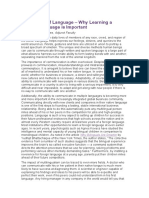Benefits of Learning A Second Language: by Julie Ellis
Benefits of Learning A Second Language: by Julie Ellis
Uploaded by
Richelle CantongCopyright:
Available Formats
Benefits of Learning A Second Language: by Julie Ellis
Benefits of Learning A Second Language: by Julie Ellis
Uploaded by
Richelle CantongOriginal Description:
Original Title
Copyright
Available Formats
Share this document
Did you find this document useful?
Is this content inappropriate?
Copyright:
Available Formats
Benefits of Learning A Second Language: by Julie Ellis
Benefits of Learning A Second Language: by Julie Ellis
Uploaded by
Richelle CantongCopyright:
Available Formats
Benefits of Learning a Second Language
by Julie Ellis
I studied French and Spanish in high school. While I did not continue my French study
in college, I did take two more years of Spanish and graduated with good fluency. While
my motivation at the time was a boyfriend from Mexico attending the same college, and
even though that relationship ended, I have never regretted being fluent in a second
language. At the time, I was unaware of many of the benefits that are now known,
based upon cognitive research.
6 Important Benefits
1. Career Advantages: People who have fluency in at least two languages (their native
and a second one) are in greater demand in the job market, and will often beat the
competition because of that second language. Any company that has or plans to have
an international presence will almost always select the candidate with 2nd language
proficiency.
2. Better Travel Experiences: When individuals speak the native language of countries
they visit, they are able to establish immediate rapport with the locals and are thus
more intimately immersed in the culture, learning things that a typical foreigner would
not. On several occasions in my travels throughout Central and South America, I was
invited into homes for meals and great discussions about politics, economics, and such.
My perspectives have certainly been broadened.
3. Improved understanding of grammatical structure in ones native language: This I
discovered first-hand as well. Just learning verb tenses in another language allowed me
to identify them in English and made me a better English teacher.
4. Brain Health: Medical studies now indicate that the part of the brain that controls
language function is improved through the learning of a foreign language. More recent
studies also indicate that learning a foreign language late in life appears to delay
dementia and Alzheimers. An important study by Dr. Thomas Bak at the University of
Edinburgh and replicated at the Perleman Medical School at the U. of Pennsylvania
show that the attention mechanisms of the brain area stretched and kept active when
older adults work on learning a foreign language.
5. Cognitive Benefits: Studies also show that children who grow up in households in
which two languages are spoken and become fluent in both of those languages have
greater ability to focus in school. They also appear to have better short- and long-term
memory functions. Some studies suggest that students do better on standardized
testing, and are better able to remember lists and sequences.
6. Personal Satisfaction: There is always of feeling of accomplishment when one masters
something, and that goes for learning a language. Not only do I feel accomplished, but
I enjoy going to a Mexican restaurant and having the ability to converse with the owners
and wait staff in their native language. When I see a Hispanic family at the store,
conversing in Spanish, I love greeting the young children and engaging them is simple
conversation. Parents are pleasantly surprised and, I believe, feel a bit more respected.
We all know that children pick up a foreign language much more easily than adults, and
that is why, of course, such instruction is begun at the elementary levels in most public
schools today. But learning languages as adults and senior citizens now appears to
You might also like
- Literacy Narrative Draft 2Document4 pagesLiteracy Narrative Draft 2api-2424405070% (1)
- Listening Comprehension Strategies in Second Language AcquisitionDocument20 pagesListening Comprehension Strategies in Second Language AcquisitionTeguh ArdiantoNo ratings yet
- Myths of Second Language AcquisitionDocument4 pagesMyths of Second Language Acquisitionvidovdan9852No ratings yet
- Promoting Literacy in The Spanish Education ClassroomDocument5 pagesPromoting Literacy in The Spanish Education Classroomapi-301896424No ratings yet
- Bilingualism: Name: 1. Nur Havizzah Suana 2. Suryani 3. Hotnida SimangunsongDocument8 pagesBilingualism: Name: 1. Nur Havizzah Suana 2. Suryani 3. Hotnida SimangunsongNeltza SiregarNo ratings yet
- Reflection Paper - Amy JohnsonDocument3 pagesReflection Paper - Amy Johnsonapi-282821288No ratings yet
- Narrative Spanish MandatoryDocument7 pagesNarrative Spanish Mandatoryapi-280524209No ratings yet
- Monolingualism in Non-Native SpeakersDocument10 pagesMonolingualism in Non-Native SpeakersJuvirlie Guinita SabunganNo ratings yet
- Senior Project PaperDocument10 pagesSenior Project Paperapi-506486647No ratings yet
- 10 Advantages of Learning Another LanguageDocument22 pages10 Advantages of Learning Another Languageethelaustria88No ratings yet
- Secondary Languages For StudentsDocument3 pagesSecondary Languages For Studentsapi-316642374No ratings yet
- Reflection On Bilingual Policy EducationDocument4 pagesReflection On Bilingual Policy EducationJella Mae YcalinaNo ratings yet
- 15 Incredible Benefits of Learning A Second Language - Learn Languages From Home 2Document1 page15 Incredible Benefits of Learning A Second Language - Learn Languages From Home 24zj8bxmtwbNo ratings yet
- Acquiring English As A Second Language: What's "Normal," What's NotDocument5 pagesAcquiring English As A Second Language: What's "Normal," What's Notapi-27788847No ratings yet
- Language: Benefits of Learning To Become Bilingual: Hannah Connell Grade 12Document4 pagesLanguage: Benefits of Learning To Become Bilingual: Hannah Connell Grade 12api-298597934No ratings yet
- Should Students Learn A Foreign Language DebateDocument11 pagesShould Students Learn A Foreign Language Debateapi-234862369No ratings yet
- Research Article Draft 1Document9 pagesResearch Article Draft 1api-508193563No ratings yet
- Importance of Language - Why Learning A Second Language Is ImportantDocument4 pagesImportance of Language - Why Learning A Second Language Is ImportantmarianaNo ratings yet
- Hispanic Family Role ReversalDocument4 pagesHispanic Family Role ReversalRick Hubbard100% (3)
- Bibliography: Acquiring English As A Second LanguageDocument4 pagesBibliography: Acquiring English As A Second LanguageJuan Alexander PulgarNo ratings yet
- Critical Incident Report (APPLS 205R)Document6 pagesCritical Incident Report (APPLS 205R)DoraYangNo ratings yet
- A Short MemoirDocument2 pagesA Short Memoirapi-356750750No ratings yet
- First Language vs Second Language, Native Language vs. Mother Tongue vs. Foreign LanguageDocument2 pagesFirst Language vs Second Language, Native Language vs. Mother Tongue vs. Foreign Languageg07haeunNo ratings yet
- BILINGUALISMDocument40 pagesBILINGUALISMdejesussofia9No ratings yet
- RamonresearchfeedbackDocument10 pagesRamonresearchfeedbackapi-349372739No ratings yet
- The Importance of Mother TongueDocument9 pagesThe Importance of Mother TongueAlexis Kaye Gulla50% (4)
- 096isb4 PDFDocument11 pages096isb4 PDFclaudiaNo ratings yet
- Second language acquisitionDocument2 pagesSecond language acquisitionЛіля ГендегаNo ratings yet
- Bilinguals and BilingvismDocument16 pagesBilinguals and BilingvismSorin TelpizNo ratings yet
- Writing Sample - Liliana Restrepo - Write Up Action Project ResearchDocument24 pagesWriting Sample - Liliana Restrepo - Write Up Action Project ResearchLilli Restrepo QNo ratings yet
- Bilingualism HandoutDocument2 pagesBilingualism HandoutAlexandra KoshchicovskaNo ratings yet
- Critical Review On Article About LanguageDocument3 pagesCritical Review On Article About LanguageMaizura Abd RahimNo ratings yet
- Bilingualism 67-72Document5 pagesBilingualism 67-72Raden Maz RandyNo ratings yet
- Benefits of BilingualismDocument2 pagesBenefits of BilingualismAtif HaiderNo ratings yet
- Critical Period Hypothesis - by NikkiDocument19 pagesCritical Period Hypothesis - by NikkiMariline LeeNo ratings yet
- BilingualismDocument15 pagesBilingualismNawfal Adnan Fleih - نوفل عدنان فليحNo ratings yet
- Brochure Independent Research Product 2Document6 pagesBrochure Independent Research Product 2api-464167673No ratings yet
- DEI - Young LearnersDocument11 pagesDEI - Young LearnersRoxana AndreaNo ratings yet
- Research PaperDocument6 pagesResearch Paperapi-402324404No ratings yet
- The Benifits of BilingualismDocument12 pagesThe Benifits of BilingualismmonidonikianNo ratings yet
- Final Researched ArticleDocument43 pagesFinal Researched Articleapi-508193563No ratings yet
- How Children Learn A Second LanguageDocument4 pagesHow Children Learn A Second LanguageAida Begic100% (2)
- 12 Myth MisconceptionsDocument2 pages12 Myth Misconceptionstheberkeleymom100% (1)
- Cambed PPTReport Chap5Document46 pagesCambed PPTReport Chap5Aepralyn CambedNo ratings yet
- Bilibgual 8Document11 pagesBilibgual 8TeeVee ThailandNo ratings yet
- Senior Project PaperDocument12 pagesSenior Project Paperapi-660856215No ratings yet
- Literature Review 1Document5 pagesLiterature Review 1api-549250963No ratings yet
- 708 Standard 1bDocument7 pages708 Standard 1bapi-385955266No ratings yet
- Edu 435 Final Reflection PaperDocument7 pagesEdu 435 Final Reflection Paperapi-666223893No ratings yet
- Peper Werk EditedDocument7 pagesPeper Werk EditedRonald Lord RodriguezNo ratings yet
- Collette Graves-Smith Myths and MisconceptionsDocument13 pagesCollette Graves-Smith Myths and Misconceptionsttsaqa8681No ratings yet
- Multiple BilingualismDocument4 pagesMultiple BilingualismalaketaNo ratings yet
- Myths and Misconceptions About Second Language Learning. ERIC DigestDocument6 pagesMyths and Misconceptions About Second Language Learning. ERIC DigestJoanna Gilbert NaehNo ratings yet
- The Benefits of Learning A Foreign LanguageDocument8 pagesThe Benefits of Learning A Foreign Languagekyzz100% (2)
- Language Acquisition of Consecutive BilingualsDocument15 pagesLanguage Acquisition of Consecutive Bilingualsapi-272686433100% (1)
- TASK 1. What Are The Benefits of Bilingualism and Multilingualism PDFDocument3 pagesTASK 1. What Are The Benefits of Bilingualism and Multilingualism PDFNuria VallsNo ratings yet
- The importance of learning English as a second language.Document4 pagesThe importance of learning English as a second language.ScribdTranslationsNo ratings yet
- Theories of Second Language Acquisition: Assessment/ EvaluationDocument2 pagesTheories of Second Language Acquisition: Assessment/ EvaluationrevinNo ratings yet
- Learn German: Step by Step Guide For Learning The Basics of The German LanguageFrom EverandLearn German: Step by Step Guide For Learning The Basics of The German LanguageRating: 4 out of 5 stars4/5 (3)
- 3rd Quarter w2Document11 pages3rd Quarter w2Richelle CantongNo ratings yet
- 3rd Quarter w3Document10 pages3rd Quarter w3Richelle CantongNo ratings yet
- 3rd Quarter w2Document11 pages3rd Quarter w2Richelle CantongNo ratings yet
- 3rd Quarter w3Document10 pages3rd Quarter w3Richelle CantongNo ratings yet
- 4TH QUARTER W1Document4 pages4TH QUARTER W1Richelle CantongNo ratings yet
- DLL - 4th QRTR - Week 3Document9 pagesDLL - 4th QRTR - Week 3Richelle CantongNo ratings yet
- DLP Week 10Document10 pagesDLP Week 10Richelle CantongNo ratings yet
- Learner Permanent Record For Junior High School (SF10-JHS) : Republic of The Philippines Department of EducationDocument2 pagesLearner Permanent Record For Junior High School (SF10-JHS) : Republic of The Philippines Department of EducationRichelle CantongNo ratings yet
- ATTENDANCEDocument2 pagesATTENDANCERichelle CantongNo ratings yet
- Propaganda TechniquesDocument6 pagesPropaganda TechniquesRichelle CantongNo ratings yet
- DLP WEEK 5Document11 pagesDLP WEEK 5Richelle CantongNo ratings yet
- FORM137ADocument3 pagesFORM137ARichelle CantongNo ratings yet
- Grade 7 Curriculum Grade 8 Curriculum Grade 9 Curriculum Grade 10 CurriculumDocument1 pageGrade 7 Curriculum Grade 8 Curriculum Grade 9 Curriculum Grade 10 CurriculumRichelle CantongNo ratings yet
- DLL - 4th QRTR - Week 5Document7 pagesDLL - 4th QRTR - Week 5Richelle CantongNo ratings yet
- DLL - 4th QRTR - Week 8Document7 pagesDLL - 4th QRTR - Week 8Richelle CantongNo ratings yet
- DLL - 3rd QRTR - Week 8Document8 pagesDLL - 3rd QRTR - Week 8Richelle CantongNo ratings yet
- DLL 2nd Quarter Wk8Document12 pagesDLL 2nd Quarter Wk8Richelle CantongNo ratings yet
- 2nd Grading - 21st CenturyDocument15 pages2nd Grading - 21st CenturyRichelle Cantong91% (11)
- ROLE DirectorDocument22 pagesROLE DirectorRichelle CantongNo ratings yet
- Learning Competency Directory (LCD)Document4 pagesLearning Competency Directory (LCD)Richelle CantongNo ratings yet
- Tos - English 9 (2nd Quarter)Document5 pagesTos - English 9 (2nd Quarter)Richelle Cantong74% (35)
- Farm EquipmentDocument3 pagesFarm EquipmentRichelle CantongNo ratings yet
- Total Enrolment (Regular & Special Programs)Document2 pagesTotal Enrolment (Regular & Special Programs)Richelle CantongNo ratings yet
- Asma G.SDocument5 pagesAsma G.SAfia FaheemNo ratings yet
- The Role of Drama in Language TeachingDocument4 pagesThe Role of Drama in Language TeachingChris ChriNo ratings yet
- 什么是创意写作?Document7 pages什么是创意写作?h68hnt1x100% (2)
- Tadl2 - Week 2Document7 pagesTadl2 - Week 2Nhung LeNo ratings yet
- t3 e 434 Using Modal Verbs Powerpoint Ver 1 (1) .196711786Document10 pagest3 e 434 Using Modal Verbs Powerpoint Ver 1 (1) .196711786Pamela Anne RiojaNo ratings yet
- FFE Level 1Document4 pagesFFE Level 1Lidia PogaceanNo ratings yet
- Wander Inn Bunbury Backpackers Aussie Slang DictionaryDocument61 pagesWander Inn Bunbury Backpackers Aussie Slang DictionaryOmid0% (1)
- PC Pca Manuals For PLXDocument15 pagesPC Pca Manuals For PLXAlex Corral GaviñoNo ratings yet
- Book ListDocument53 pagesBook Listfilologic0% (1)
- Buckingham 2006 Defining Digital Literacy What Do Young People Need To Know About Digital MediaDocument14 pagesBuckingham 2006 Defining Digital Literacy What Do Young People Need To Know About Digital MediaMaricelZanabriaNo ratings yet
- Reported SpeechDocument3 pagesReported SpeechAlexandru LicaNo ratings yet
- By Group: 1 - Anggun Syafitri - Sukmawati Said - Inri Evelin Glenie Tonto'u - Tarisa - Moh. Aswar Gani - Moh. Idul Paroku - Nur Anissa - RiskawatiDocument5 pagesBy Group: 1 - Anggun Syafitri - Sukmawati Said - Inri Evelin Glenie Tonto'u - Tarisa - Moh. Aswar Gani - Moh. Idul Paroku - Nur Anissa - RiskawatiRisna SaidNo ratings yet
- OCLA Jordan June 2023Document3 pagesOCLA Jordan June 2023Hamza AwawdehNo ratings yet
- Lesson Plan JanDocument19 pagesLesson Plan JanMelissa MorrisNo ratings yet
- TOEFL IBT Listening Practice Set 3 LectureDocument11 pagesTOEFL IBT Listening Practice Set 3 LecturemedoNo ratings yet
- Letters of May JuneDocument11 pagesLetters of May JuneRamNo ratings yet
- Day 1 - Session 4Document4 pagesDay 1 - Session 4shivkumar.ggv.123No ratings yet
- BA Prog Sem 4 RK (Speech Writing)Document5 pagesBA Prog Sem 4 RK (Speech Writing)Buddhadeb SarkarNo ratings yet
- Lección 123 - Simple Past Tense - Yes-No Questions - EetvDocument3 pagesLección 123 - Simple Past Tense - Yes-No Questions - Eetvbaguaalejandra14No ratings yet
- Comparative Degree of InferiorityDocument6 pagesComparative Degree of InferiorityShergioChejithoNo ratings yet
- Communication Skills AssignmentDocument4 pagesCommunication Skills AssignmentAbdul Karim KamaraNo ratings yet
- CHP1 The Purposes of Linguistic Analysis - Thompson, 2004Document13 pagesCHP1 The Purposes of Linguistic Analysis - Thompson, 2004Karenina ManzanoNo ratings yet
- CPHL 214 Assignment 2Document2 pagesCPHL 214 Assignment 2NazNo ratings yet
- Forming AdjectivesDocument5 pagesForming AdjectivesJose GilNo ratings yet
- UWI1A2-English For Global Career Readiness: My Plan To Pursue My Dream JobDocument92 pagesUWI1A2-English For Global Career Readiness: My Plan To Pursue My Dream JobYudistiari ReditaNo ratings yet
- q3 Pe Lesson 2 ScrabbleDocument60 pagesq3 Pe Lesson 2 Scrabbledelacruz.483586160011No ratings yet
- 2-Media and Its Representation of The SocietyDocument23 pages2-Media and Its Representation of The Societysunday.sundey789No ratings yet
- The Roles of Child Gender and Parental Knowledge of Child Development in Parent-Child Interactive PlayDocument14 pagesThe Roles of Child Gender and Parental Knowledge of Child Development in Parent-Child Interactive PlayEnzo AlarcónNo ratings yet
- Reflections On Whale TalkDocument5 pagesReflections On Whale Talkapi-264464926No ratings yet














































































































